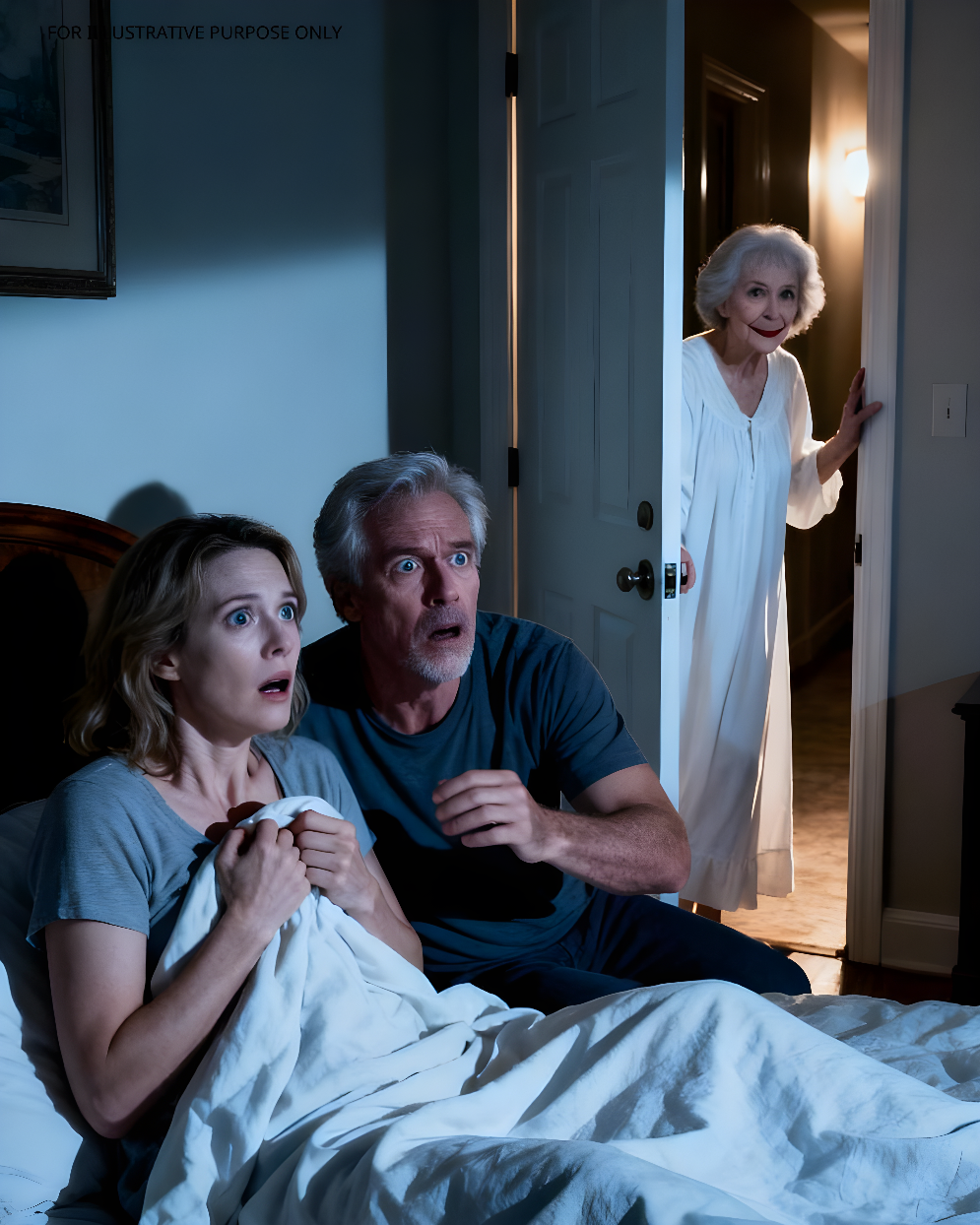Liam and I had been married just over a year, living quietly in our Boston home. Life felt peaceful — almost too peaceful. That is, until a strange pattern began to unfold.
Every single night, precisely at 3 a.m., there was a soft, deliberate knock on our bedroom door.
Knock. Knock. Knock.
It was never loud, but enough to wake me each time.
At first, I thought it might be forgetfulness or confusion — maybe she needed something. But when I opened the door, the hallway was always empty. Dimly lit. Silent.
Liam brushed it off. “Mom doesn’t sleep well,” he said. “She wanders sometimes. Nothing to worry about.”
But after nearly a month of nightly interruptions, my unease grew. I had to know the truth.
Setting up a hidden camera
One evening, I quietly placed a small camera above our bedroom door, careful to remain discreet. Liam had no idea — he would have said I was overreacting.
That night, as usual, the knocks came. Three soft taps. My heart raced as I lay still, pretending to sleep.
The next morning, I played the footage. What I saw made my blood run cold.
Margaret, Liam’s mother, wearing a long white nightgown, stepped out of her room. She walked slowly down the hallway, stopping right outside our door. She looked around, as if checking that no one could see her, and then knocked three times.
Then she stood there. For ten minutes. Silent. Motionless. Eyes blank, distant, listening — as though waiting for something, or someone. Finally, she turned and walked away, vanishing down the hall.
Confronting the mystery
When I showed Liam the footage, his face drained of color.
“You knew something, didn’t you?” I asked.
He hesitated, then whispered, “Mom doesn’t mean any harm. She just… has her reasons.”
That afternoon, I decided to confront Margaret directly.
“I know you’ve been knocking on our door every night,” I said. “We saw the video. I just want to understand — why?”
She set her tea cup down carefully, eyes sharp and unreadable.
“What do you think I’m doing?” she said quietly. Then she stood and walked away.
Uncovering the truth
Later, I reviewed more footage. After knocking, Margaret pulled a small silver key from her pocket, holding it to our bedroom lock — not turning it, just pausing for a few seconds — before leaving.
Desperate for answers, I searched Liam’s nightstand and found an old notebook. One entry read:
“Mom still checks the doors every night. She says she hears noises — but I never hear anything. She asked me not to worry, but… I think she’s hiding something.”
When Liam read it, he finally opened up.
“After my father passed away years ago,” he explained, “Mom developed severe insomnia and anxiety. She became obsessed with checking locks and doors, convinced someone was trying to break in. Lately, she’s been saying things like… ‘I need to keep Liam safe from her.’”
I froze. “From me?”
He nodded, guilt in his eyes.
Seeking professional help
We realized it was time for help. A few days later, we took Margaret to a psychiatrist in Cambridge. She sat quietly, hands folded, eyes down.
We explained the knocks, the keys, and the strange nighttime behavior. The doctor asked her gently:
“Margaret, what do you think is happening at night?”
Her voice trembled. “I have to make sure he’s safe… he’ll come back. I can’t lose my son again.”
The doctor explained the root of her fear: thirty years ago, an intruder had broken into Margaret’s home. Her husband had confronted the man — and did not survive. From that night, Margaret’s mind associated darkness and nighttime with danger. When Liam entered her life, her anxiety mistakenly saw me as a threat.
She didn’t hate me. She only wanted to protect her son.
Healing through love and patience
The doctor prescribed therapy and gentle medication, but emphasized a simple truth: trauma doesn’t disappear overnight. Love, patience, and consistency are what help it fade.
That evening, Margaret approached me, tears in her eyes.
“I don’t want to frighten you,” she whispered. “I just want to make sure my son is safe.”
For the first time, I reached for her hand. “You don’t have to knock anymore,” I said softly. “No one is coming for us. We’re safe. Together.”
She broke down, her tears those of a child finally feeling seen.
Creating new routines
Healing wasn’t instant. Some nights she still claimed to hear footsteps. Sometimes my patience frayed. But we learned to walk through her darkness with her.
-
Every night, we checked the doors together.
-
We installed a smart lock for peace of mind.
-
We shared tea and conversation instead of fear.
Slowly, the 3 a.m. knocks stopped. Margaret’s laughter returned. Her eyes softened. The doctor called it progress — I called it peace.
The lesson
I finally understood something vital: healing someone isn’t about “fixing” them. It’s about walking alongside them through their darkness, staying long enough to see the light return.
Margaret’s story reminded me that family isn’t only about love and connection — it’s also about patience, empathy, and the courage to face fears together.
Through fear, anxiety, and late-night knocks, we learned that love isn’t just comforting — it can heal, slowly but surely.
